Ricochet is the best place on the internet to discuss the issues of the day, either through commenting on posts or writing your own for our active and dynamic community in a fully moderated environment. In addition, the Ricochet Audio Network offers over 50 original podcasts with new episodes released every day.
 Weekend Contest: The Best of Times
Weekend Contest: The Best of Times
I’m not persuaded that but for social media, we wouldn’t notice that the world’s a bit of a mess. But for a change, let’s leave Obama out of this.

Whether or not the circumstances objectively warrant our sense that the world is falling apart, few of us feel we’re living in the best of times. No doubt, we enjoy standards of health care, hygiene and physical comfort that would have astounded members of any previous society; no doubt, we enjoy extraordinary personal freedom; no doubt, we live in interesting times. But would anyone here disagree that we are nonetheless fearful, insecure, contentious, sour and pessimistic? If we are not worrying about war and terrorism, we are worrying about losing our jobs, nuclear proliferation, and cultural rot. Perhaps the cause of this is social media, perhaps not, but everyone senses this mood of deep unease, of constant self-reproach.

Let’s think about this in a different way. In rare moments in history, ordinary men and women have been uncommonly contented. By contented I mean precisely what those men and women meant: This is not my judgment of them; it is their judgment of themselves, reflected in their letters and their arts. They were contented with their social and political lives. They found their daily activities pleasurable. They considered themselves remarkably fortunate to be alive at that very moment, in that very place. They were sunny in disposition, at peace with themselves, and above all, optimistic. I’m not concerned here with the occasional contented individual, but with contented societies, ones that really existed. Historians and journalists are drawn to the awful—to brutishness and malaise, to war and plagues. There are fewer books about contented times. But these periods did occur, casting a warm golden glow over what is otherwise a long depressing slog.
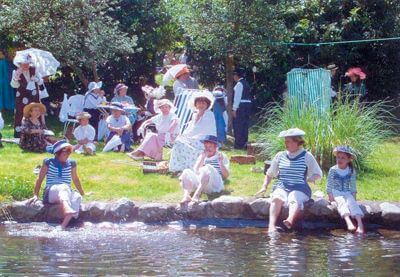
What makes a moment in human history one of the best of times? Certainly not scientific achievement or brilliance in the arts. Europe in the 17th century was a time of unparalleled scientific advances, but very few men and women alive then thought their epoch splendid, or comfortable, or even decent. Fifth Century Attic Greece was the most brilliant society ever known, but it was a world in the process of destroying itself, and everyone knew this, and so no one was happy in the plain, ordinary sense of the word.
I can think of perhaps five or six such episodes in world history. I propose:
- Rome under the Antonines, from roughly 160 AD to 220 AD.
- Baghdad under the Caliphate, from roughly 800 to 1000 AD.
- Western Europe under the peace of Innocent III, from roughly 1200 to 1300.
- France during the Belle Époque, from say 1880 to 1914.
- Vienna under the Emperor Franz Joseph, from 1865 to 1914.
- The United States under Dwight Eisenhower, from 1952 until 1963.
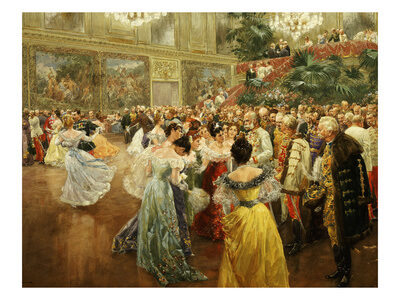
My list is obviously arbitrary: I haven’t included certain civilizations, Chinese and Indian civilization in particular, because I don’t know enough to make a case for them.
What do the periods above have in common? I note the following, and suggest that in all likelihood, these will be common features of all happy times:
- The best of times were placid. There were no major wars, civil upheavals, revolutions or epidemic diseases.
- The best of times were times in which change was incremental and slow.
- The best of times were times in which there were stable, long-lasting structures of civil and religious authority.
- The best of times were times when popular moods were neither cynical nor ironic, but rather earnest and dutiful.
- The best of times were times in which the arts of civilization—art, music, literature, but also woodworking, ceramics, pottery, cooking—flourished unobtrusively.
- The best of times were times in which religion was accepted as an aspect of life, but in which conformity to religious doctrine was not enforced beyond certain limits.
- The best of times were times of strong but limited state power.
- The best of times were times in which a strong and respected military kept external enemies at bay.
- The best of times were times in which both state bureaucracies and state legal systems functioned efficiently and were seen to function efficiently.
- The best of times were times in which marriage was seen as the normal standard of adult life.
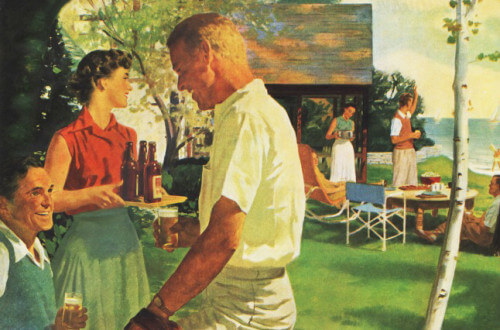
What do you think were the best of times, and why? Remember: I am not looking for times of genius, greatness, or heroism: I am looking for moments of general human contentment. I’m looking for moments that were dominated by vibrant and attractive men and women, people who were life-sized, engaging, personable, decent and accessible, but not by ones who were larger than life—those types, for better or worse, tend to occur in the worst of times.
Now here are the rules: Your entry must…
- Make a case for the period, in general, in fewer than 200 words. No copy-pasting, and no linking. Your own words only.
- In a separate comment, illustrate the contentedness of an ordinary man or woman of the epoch by appeal to their letters or their arts. (Copy-pasting is obviously fine.)
- I repeat: two comments total to argue for one epoch: one for your argument, one for your example.
- You may make the case for multiple epochs, but each requires a separate comment and separate example.
- The present time is excluded. I know some of us are very contented. But we’re “occasional contented individuals,” not a contented society.
The winner will receive this highly attractive and coveted image of a trophy.

Have a contented weekend, Ricochet!
Published in General




I don’t know if 1989-2001 is too recent but it meets much of your criteria. The fall of Communism left us without a major threat to our security. Only a couple of minor dust ups in Bosnia and Somalia. Terrorism was a back page issue that happened in a distant embassy but couldn’t possibly take place here. Crime rate dropped substantially. Welfare was finally wrangled in. Economic growth after the recession in 1992 was always around 5 or 6%. The federal government balanced the budget and we even had a Democrat president proclaim “The era of big government is over.” The rise of the internet made peoples lives better before people became addicted to it.
edit: Forgot to mention the first Gulf War. Oops! But a relatively minor war.
The Mali Empire in the early 14th century. It grew, over the preceding decades, in a more or less sane manner; it absorbed Islam more or less calmly; it got so rich its emperor, on his pilgrimage to Mecca, flooded that area of the world with gold; and when the emperor returned to Mali, his empire was still there, and would remain in existence for many more years.
However…
…the only handy source I can find testifying to real, in-the-moment, consciously perceived Malian contentment is from ibn Battuta. Which is really to say he’s content, if everybody gives him lots of stuff and shows plenty of respect for the religion that employs him. Still, that emperor was able to induce an Andalusian poet-architect to come back to Mali with him – the place must have been feeling vigorous. I get the idea that if 14th-century Mali had had trains, they would have run on time and everyone would have expected them to.
To do this assignment justice, Claire, requires some time, thought and research. Not sure I am up to it (on vacation in Zurich). I am embarrassed by my limited knowledge of history.
Norman Rockwell lived through two World Wars. Caspar David Friedrich saw the Napoleonic Wars. I’m not sure pleasant scenes in art derive so much from peaceful times as from peaceful hearts.
Also, as WWII demonstrates, uplifting art can be very popular when current events are anything but.
Pop music tamed itself from 1999-2001. Rap went from “[bleep] the police” and “Cop Killer” to “Get jiggy with it.” Popular sentiment in rock went from the angst ridden Nirvana to the swing music of Big Bad Voodoo Daddy. We were all putting our arms in the air and waving em like we just don’t care. Care free times they were.
Best. Freudian. Slip. Evar!
May we crib from The Third Man?
I’m looking for moments that were dominated by vibrant and attractive men and women, people who were life-sized, engaging, personable, decent and accessible, but not by ones who were larger than life—those types, for better or worse, tend to occur in the worst of times.
The moment I read this sentence an immediate image came to mind of NYC in the 80s and 90s. Although crime didn’t begin to abate until the Giuliani administration, there was a plethora of interesting new artists (Schnabel and the graffiti man Basquiat) even as the symphony and opera were alive and well. Broadway producers were not obsessed with tired remakes of corny musicals and the off-Broadway scene was thriving. An enormous variety of cuisine was introduced (Thai, Indian, Japanese, Caribbean). Business was healthy, the cost of a round trip subway token was $1.50 and you could “cab it” almost anywhere for under $8.00. Black was the ‘it’ color in fashion (which is practical for urban living and flatters all women) and a nice pair of designer shoes did not cost $600. You could still afford a decent apartment with only one roommate. Best of all, small, independent bookstores – my favorite, Shakespeare – were able to stay in business.
The best of times is now. We sleep securely in comfortable beds, in air conditioned comfort. Food is abundant, especially relative to the past. Good grief, our poor are overweight, when in history did that happen? Due to drug and medical device technologies, healthcare is the best it as ever been, although paying for it is a challenge. We know what the weather is going to be days from now. In the past you didn’t know if changes were coming in a few hours or even minutes. The best art, music, and literature is at our finger tips. Employment opportunities still exist for those willing and able to work hard. Could our world today be better? Of course, but it is still the best it has ever been. There is no time in history that I would rather live than now.
Ms. Claire, of all the choices you give us, I would have to go with the Eisenhower years through today. Notice the other choices you present lasted many decades. Both thelonious and Pony Convertible see things as I see them. Just the advances of medical care alone is enough to prefer our own times. For art, think Hollywood movies of the fifties, Madison Avenue advertising of the sixties, the architectural reversion of the seventies and eighties (admittedly in reaction to awfulness in architecture in the sixties, but still an indication of interesting development). As far as music goes, the jazz composers of the fifties gave us a catalog that is still being mined today (Ellington, Brubeck, Jobim, etc.) and pop music has embraced a staggering variety (Motown, folk, rock&roll, seventies rock, blues revival; even hip-hop has a few enjoyable exemplars).
Even the depths of Cold War anxieties were actually lived out during a “Pax Americana.”
Of course, this is a short-sighted view of things, because it neglects awful events in Asia and Africa in which tens of millions were murdered. But I think every one of your candidate periods have similar downsides.
Ancient Israel under Shlomo HaMelech/King Solomon (first half of his reign — second half probably considerably less so given the tax and public-service/construction burdens he placed on many).
Similarly, the first half of Israel’s Chashmona’im/Hasmonean monarchical dynasty.
I would add that Claire’s #4 and #5 were both not terribly great for both locales’ Jewish populations (albeit they weren’t subjected to outright pogroms, and many of the more prosperous among these Jewish communities were in denial about how much they were loathed).
I would posit Victorian England as well:
Sherlock Holmes:
19th century Europe was pretty nice. It’s a shame they went and messed it all up.
I am persuaded at that argument, actually. How many people, for example, remember that in the 1980s Islamic terrorism killed tens of thousands in Lebanon? How many people remember that in the early 80s Assad senior killed tens of thousands of his own people in Hama?
How many people remember that in the early 90s the Russian regime killed thousands of Georgians in Abkhazia, ethnically cleansed hundreds of thousands, and also shot down 2 civilian airliners full of passengers?
All these are events which resemble the situation in the world today, except that at the time they happened, they attracted only a small amount of attention and were little more than historical footnotes even in their day.
Today, however, any of these events would be big news, same as ISIS, Syria and Ukraine are today.
Having access to instantaneous information, and constant news coverage of every minute event around the world, gives the appearance that today’s world is more “violent” or “volatile” than in the past.
Millions of people were killed in wars in the 1980s. Yet, few even remember those wars today. Iran-Iraq war? Never heard of it. Millions were killed in the 90s, yet except for some distant memory of a place called “Yugoslavia”, or some obscure reference to a place called “Chechnya” little remains in our collective memory. (and of course, no one even heard of Nagorno-Karabakh, or Abkhazia, even when they happened)
Every generation always thinks their time is the worst of times. They are almost always, wrong.
As for what is the “best of time”, I don’t agree with very many of your criteria. But then again, everyone has their own criteria.
I’ll just give some exhibits for what I would consider as “the best of times”:
1) Economic growth
2) Infant mortality rates
3) Mortality rates in wars
4) Agricultural production
5) Energy abundance
It would be hard to find a metric which you can show that today’s world is somehow “worst” than any period in the past world history. It is certainly very easy to find lots of metrics to show that today’s world is…by far…the best time in human existence.
As for institutions, it hard to argue that today’s world doesn’t have the most developed, stable, institutions which allow for the greatest level of individual, political and economic freedom of any point in world history. Even if we may complain about the US today, in retrospect, even in the US the situation is at worst…the same…and at best, better than in the past (after all, if you were black in the 1950s-60s, you might have disagreed on that being the “best of times”).
Could the Victorian Era be considered the best of times for England? The empire was expanding and there was much pride in that amongst all the people. Also, Queen Victoria and her husband were the model of propriaty, even if the rest of the population couldn’t live by their standards at least they had a model to try to live up to. I know there were problems with this period as well but the Victorian Era at least set a standard for England that still endures today.
These are the best of times, for they are our times. I know that’s cheating, but it also puts things into perspective. We think of the past and worry about the future. But time is always now. And the now is awesome beyond measure. I am sure, such has always been the case.
Perhaps this is a stretch, but I am going with the very late Paleolithic, let’s say between 30,000 to 15,000 years ago. Most hunting and gathering communities had a sufficient level of technology to guarantee their subsistence, and my guess is that they were very content. There were no giant social or political distinctions to compete for, and cooperation, sharing, and community were valued. They had an intuitive understanding of the natural world and an appreciation of the lives of plants and animals that we lack today. Contentment is hard to define, but I am pretty sure that they would have been far more content than we are today. No social striving, no stress about office politics or the kids’ SAT scores, no worries about mid-term elections. This is obviously a very simplistic presentation of the late Paleolithic, (and a hotly debated one in anthropology,) but I do get the sense that the simple life that we often yearn for in modern times was a lot like daily life for hunters and gatherers. That is my vote, and I think that it fits nicely with Ms. Berlinski’s criteria.
The first piece of art comes from Lascaux Cave:
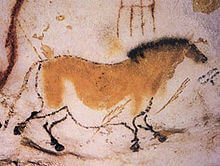
The second piece of art in a Venus figurine:
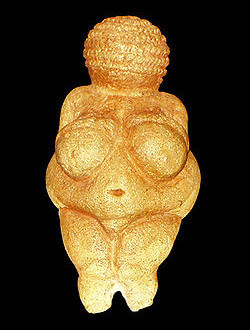
Both of those show a simple contentment with life. Reliance on the animals and the mysteries and joy of female fertility.
Well; I suppose OK on the first one, which was peaceful because God caused all the surrounding great powers to be occupied with their own internal rivalries and insurrections so that Solomon could rule in peace. Halcyon days perhaps, but only for the Israelites.
I don’t think you have much of a case for the second one. As I read Maccabees, it looks like an 80-year civil war of independence from Syria, punctuated from time to time with short periods of quiet.
American Abroad, your description of paleolithic man is entirely derived from speculative work that romanticizes the scene of primitive peoples, echoing some very misguided Enlightenment influences.
L think your perception of primitive life is wrong, and not only that; I don’t believe your dating.
You may not have had any experience with a subsistence lifestyle. I suggest you ask the Somali and Ethiopian refugees drowning in the Mediterranean to go to the shores of Italy for a piece of the modern world, why they left their content lives in a subsistence-level economy.
Every generation looks back with nostalgia at a “simpler” happier time. They are almost always, wrong, in their interpretation of the past. When 3/4th of your children died before reaching the age of 1, and most women died in childbirth, I’m not sure it’s the “joys” of female fertility they were trying to capture with that figurine.
Is what all these times of contentment have in common that they followed times of upheaval? Iow people felt fortunate that bad times had passed, they were relieved.
Speaking of, what do you guys think dating was like before the invention of shampoo, daily showers, feminine products, razor blades, modern clothing materials or even deodorants?
Things that today cost so little and are so abundant, I couldn’t even tell you the price of any of them if you asked me to, because I never even consider the price.
I mean, forgetting for a moment that there was no such thing as “dating” for most of the world, up until today, and women in most of the world, up until very recently, were simply forced to marry some stranger (or even if they chose, it was still a relative stranger they were marrying)…how enjoyable would it have been to be next to a person in the 1800s?
To find out, I suggest visiting North Korea, or Cuba, or most places in Eastern Europe in the 1980s. Fun fun times. Showers…once a week.
I’ll trade their pretty art from the 18th century any day for a toothbrush.
Interesting thought ….
MJ Bubba: Yes much of it is speculative, which I acknowledged in the post, but there is ample anthropological evidence that certain hunting and gathering communities lived very contented lives, while others, to borrow an Enlightenment phrase, lived lives that were “solitary, poor, nasty, brutish, and short.” Groups that were were able to successfully fish, for example, had it much easier than those living in less productive environments. Areas with higher population densities tended to have more conflict. There is no single model that accurately represents these groups.
AIG: I don’t think comparing paleolithic societies to modern day Somalis or Ethiopians is a fair comparison. A more appropriate comparison is to look at the Khoisan groups of southern Africa to see how their subsistence lifestyle works for them.
Thanks for the closing wish, Claire, but pondering this assignment does not make for a contended weekend. Out of solipsism (I was alive then) and confirmation bias (I remember the general ‘feeling tone’ of the times), I must choose the Eisenhower period as one of general contentment. Although there were exceptions and beginnings of significant change – the ‘beat’ generation,’ Brown v. Board of Education, McCarthy hearings, Elvis, the Cold War – the times largely consisted of uniformity and hard work. This contrasts poignantly with the ubiquitous ‘fear, insecurity, contentiousness, sourness and pessimism’ of today. Then, politics were marginal and incidental to our lives. Now, it is inescapable.
Time’s Henry Luce coined “The American Century” back then. This described the pervasive sense of pride and optimism wherein all good things seemed possible. I had an unarticulated belief that humanity had turned a corner, such that things like the horrors of WWII could never be repeated. I suppose this reveals a certain naiveté or innocence, which comes to mind when I recall the Broadway shows and music of the time. I remember feeling ennobled after “Damn Yankees,” “Camelot” and the like. Today’s “entertainment,” by contrast plumbs the depths of human depravity.
I’ll nominate the Tokugawa period of Japanese history for its longevity. It’s hard to beat 250 years of peace, prosperity, and high culture even if the material culture was relatively medieval. Got to hand it to the Japanese for being the only Asian culture to put a premium on personal hygiene and cleanliness. What’s not to like?
Re Paleolithic man: We may not have a time machine to go and see what Paleolithic societies were actually like, but we do have extensive documentary evidence from first-hand contact with Native American tribes, from the 1600s through the 1800s. While not claiming expertise in this field, my impression is that there were vast differences in culture from tribe to tribe, and thus, likely, vast differences in contentment or lack of same.
Mugwump beat me to the punch on Tokugawa Japan. I’ve studied the Meiji Restoration much more than the Edo Period, but I’m sure that the Tokugawa’s isolation would have contributed to stretches of time where all seemed well, placid, and orderly. By 1858, though, the illusion was impossible to maintain.